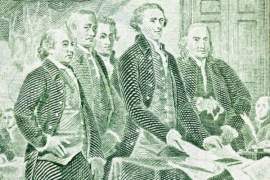
Who Is Roger Taney

Popular In Constitution
Purpose Of Lifetime Appointment And Pros And Cons Enumerated Powers Bicameral Legislature Background Article 3 Of The Constitution We The People 1st Amendment Who Wrote The Constitution Judicial Review Equal Protection Clause 5th Amendment 10th Amendment Three Fifths Compromise
Roger Taney was the fifth Chief Justice to the Supreme Court, reigning from 1836-1864. He is documented as being the first Roman Catholic to oversee the Supreme Court of the United States, and also served as a United States Attorney General. Today he would be considered as one of the more controversial political officers of his time, promoting African Americans as an inferior race unworthy of mixing with the white race, which ultimately lead to the ruling of African Americans not being worthy of citizenship. As far as governmental practices he is also remembered for his ruling in the Dred Scott v. Sandford case.
Different from other Chief Justices that ruled before Roger B. Taney focusing on Federal laws, Taney showed favoritism towards the powers of State governments. It was documented from earlier cases that the rulings of Roger B. Taney were more concentrated on the developmental powers of the states regarding slavery, rather than implementing or enforcing Federal regulations. Most of his rulings left it up to the states to regulate commerce which was already passed as a Federal law.
Roger Taney's unfair and impractical rulings went without much criticism until the case of Dred Scott v. Sanford came about in 1857. The ruling in the case of Dred Scott is documented as the indirect cause of the Civil War. Although the actual lawsuit against Dred Scott was set to be dismissed, Roger Taney wrote the actual ruling over the case of Dred Scott, representing his version of United States governance.
In this ruling, Roger Taney declared that Congress had no right to prevent the spread of slavery from reaching Federal territories, and any attempt to restrict the practice of slavery was unconstitutional. This bizarre ruling of Roger B. Taney lead to two refusals of the Federal Government: the first being the resignation of another Supreme Justice member, Benjamin Curtis. Another major occurrence due to the rulings of Roger Taney was the opposition of this ruling by many members, fighting for the abolishment of slavery. The language Roger Taney used to express his rulings only further angered those in opposition to slavery, which started with his referral to African Americans as an " unfortunate race".
Many people found the ruling of the Dred Scott v. Sanford case and the original view of Roger B. Taney towards slaves contradictory. In earlier years, Roger Taney was known for emancipating his own slaves as well as providing pensions to his slaves that were too old to work. It is a question as to why Roger B. Taney's views on slavery changed over time.
Earlier observations would show his disapproval for the practice and spread of slavery. However, his ruling in the Dred Scott case proved otherwise, only strengthening the beliefs Northerners had of slavery being abolished. It was thought that Taney was determined to make the emancipation of slavery unconstitutional. However, the occurrence of the American Civil War prevented that from happening. Ironically Roger Taney passed away in 1864, during the time that slavery was abolished in his home State of Maryland.
NEXT: Who Is Warren Burger





















